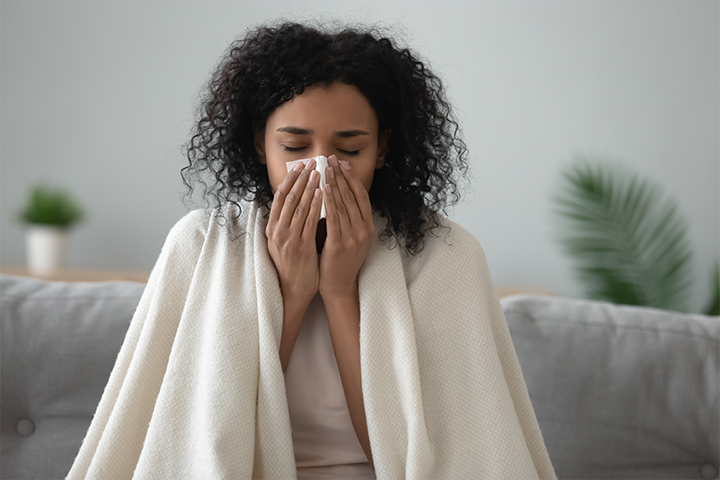For some, spring welcomes more than warmer weather and sunshine. The season can also bring sneezing, wheezing and coughing thanks to seasonal allergies. Keep reading for the lowdown on coping with Texas allergies.
Everything’s Bigger in Texas
There are so many great things about living in the Lone Star state. Allergy season isn't one of them. Dallas was No. 2 on the Allergy and Asthma Foundation of America's most recent Allergy Capitals study, which ranks the top 100 U.S. cities by their seasonal pollen allergies.
Other Texas cities on the list include:
👉 Houston at No. 12
👉 McAllen at No. 25
👉 San Antonio at No. 37
👉 El Paso at No. 39
👉 Austin at No. 97
Pollen isn't the only problematic allergen in Texas. The state is also high in ragweed, elm and mountain cedar. Coastal areas like Houston and The Gulf may also have more mold.

Not Just a Spring Thing
Seasonal allergies often pop up in the spring, but Texas' unique climate, especially its dry winters, means allergies are here nearly year-round. Here's what you can expect in different seasons.
- Spring: Pollen from oak trees is the main culprit in spring. Other trees like elm and pecan may also cause allergies this season.
- Summer: Grass allergies typically spike in summertime. While you may not have issues in your own backyard, grass growing in other areas (open fields, side of the road, etc.) can trigger symptoms.
- Fall: Ragweed counts rise in fall, especially in more temperate areas of the state.
- Winter: Many Texans struggle with winter allergies. “Cedar fever" caused by cedar trees can be so bad it mimics flu symptoms.
What can you do?
Coping with Texas allergies can be challenging, but there are things you can do to help.
1. First, figure out if you're really dealing with allergies or if you're sick.
It's not always easy to tell because allergies and colds have symptoms in common, like:
- sneezing
- the sniffles
- sore throat
You usually have allergies with:
- itchy eyes
- symptoms that last more than two weeks
2. See your doctor and make a plan.
Even if you're sure you've got allergies, it's important to let your doctor diagnose you and make a treatment plan, because:
- Buying over-the-counter allergy medicine may temporarily improve your symptoms, but you still won't know what you're allergic to.
- Your doctor will have the most current information about treatments or medications and can tell you about any drug interactions or side effects.
- Your doctor may recommend an allergy test, where common allergens are placed on the skin to see if there's a reaction.
Based on your symptoms and the results of your test, your doctor may suggest medication, including:
- antihistamine nasal sprays – for temporary relief
- corticosteroid inhalers – often prescribed to treat asthma caused by allergens
- corticosteroid eyedrops – to relieve itchy eyes
- oral corticosteroids – for treating more serious symptoms
- allergy shots – for severe allergies that aren't responding well to other treatments
Depending on your allergies, your doctor may recommend a prescription medication. Be sure to ask if there's an over-the-counter version. This may save you money.
10 Ways to Reduce Symptoms
You may be able to improve your allergies in many other ways, including:
- Pay attention to triggers. Keeping a log or journal can be helpful so you don't forget key details.
- Stay hydrated. Drinking plenty of water can help you flush allergens and keep your sinus cavities from drying out.
- Sleep with a cool-mist humidifier at night. This is another way to keep your sinus passages moist.
- Take a hot shower or do a facial steam. It can loosen up congestion.
- Get a Neti Pot. Be sure to use distilled water; tap water isn't safe to use in a Neti Pot.
- Limit your time around known allergens. These include pets or pollen.
- Alert your doctor about new or changing symptoms.
- Keep allergy medications and a rescue inhaler with you, if needed. If you have an EpiPen®, keep that with you, too.
- Quit smoking and stay away from second-hand smoke.
- Pay attention to air quality and weather forecasts so you're prepared for conditions that could worsen your symptoms.
More About Pets
According to the Allergy and Asthma Foundation of America, pet allergies affect up to 20% of people around the world. You may choose not to have a pet if you're allergic to dog hair or cat dander. But there are ways to manage symptoms:
👉 Limit the areas pets can access in your home.
👉 Keep pets off upholstered surfaces like your couch.
👉 Keep pets out of your bedroom.
👉 Bathe your pets often.
👉 Take your allergy medication as prescribed.
👉 Buy an air purifier with a HEPA filter.
👉 Cover beds with hypoallergenic mattress and pillow covers. These covers may also help protect you from dust mites.
Limiting Mold Exposure
Mold can be dangerous for everyone, but it's especially important to stay away if you have an allergy. Here are some tips for keeping mold away:
1. Pick up wet or damp items like towels or clothes and dry them quickly.
2. Check wet areas like kitchens and bathrooms regularly for mold growth.
3. Fix water leaks and fix or replace any areas with water damage quickly.
4. Scrub hard surfaces with vinegar and water to remove mold. Be careful with bleach because it may trigger an asthma attack.
5. Use a dehumidifier in high-humidity areas and climates.
6. Run exhaust fans in the bathroom and kitchen to reduce humidity.
Allergies May Change Over Time
The allergies you had as a child may not be the same today. You could have stopped reacting to an allergen altogether, developed a whole new allergy, or your symptoms could be different than they used to be. Allergies can change for many reasons, including:
👉 Age – Many people naturally “outgrow" some allergies.
👉 Immune system – This generally gets weaker as we get older. But being healthier in general may improve your immune system, which could make your allergies better.
👉 Your environment – Did you switch schools or classrooms, or move to a new city or neighborhood?
👉 Routine – Are you cleaning more or less? Using a new disinfectant, detergent or shampoo?
If your allergy symptoms have changed or you have new symptoms, be sure to check in with your doctor. It may be time to change your treatment.
How Your TRS Plan Can Help
Keeping up with preventive care is key to staying healthy for everyone. For people with allergies, it's even more important.
TRS plans cover allergy care, testing and evaluation.
TRS-ActiveCare Primary
Testing: $30 copay for primary care provider (PCP) or $70 copay for specialist; 30% coinsurance after you meet your deductible
Injections or Serum: 30% coinsurance after you meet your deductible
TRS-ActiveCare Primary+
Testing: $15 copay for PCP or $70 copay for specialist; 20% coinsurance after you meet your deductible
Injections or Serum: 20% coinsurance after you meet your deductible
TRS-ActiveCare HD
Testing, Injections or Serum: 30% coinsurance after you meet your deductible (in network); 50% coinsurance after you meet your deductible (out of network)
TRS-ActiveCare 2
Testing, Injections or Serum: 20% coinsurance after you meet your deductible (in network); 40% coinsurance after you meet your deductible (out of network)
TRS-Care Standard
Testing, Injections or Serum: 20% coinsurance after you meet your deductible (in network); 40% coinsurance after you meet your deductible (out of network)
TRS-Care Medicare
👉 $0 copayment for each allergy injection, serum or both in a doctor's office
👉 Deductible does not apply to allergy injections or serums.
👉 A PCP or Specialist office visit copay may apply.

Resources for TRS-ActiveCare and TRS-Care Standard
Prescription Coverage
Express Scripts administers your prescription drug benefits and they cover many allergy medications. Visit your health plan's prescription drug website to check for allergy medication coverage details.
Wellness Coaching
Work one-on-one with a registered nurse to help manage your allergies or with a nutritionist to plan an allergen-free diet. They're just two of the credentialed health experts available to you at no cost through your TRS health plan's Wellness Coaching program.
Well onTarget®
Well onTarget®offers self-management programs, tips and resources to help you manage asthma. Access videos, podcasts, 12-week programs and other tools anytime, day or night.
Personal Health Guides
A Personal Health Guide (PHG) can help you with your wellness needs, find you a provider, make an appointment, get claims information, do cost comparisons, and more. Talk to a PHG 24/7. Call 1-866-355-5999 or chat in the BCBSTX App.
Resources for TRS-Care Medicare
Prescription Coverage
Express Scripts administers your prescription drug benefits, and they cover many allergy medications. Visit your health plan's prescription drug website to check for allergy medication coverage details.
Find a Provider
Need help finding a doctor? Call UnitedHealthcare at 1-866-347-9507, TTY 711, 7 a.m. – 6 p.m. CT, Monday – Friday.